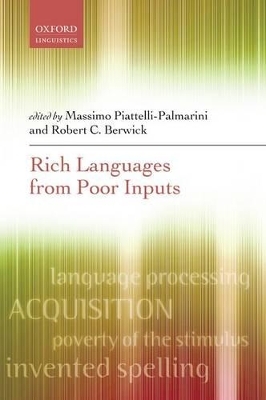
Rich Languages From Poor Inputs
Oxford University Press (Verlag)
978-0-19-873671-4 (ISBN)
This book addresses one of the most famous and controversial arguments in the study of language and mind, the Poverty of the Stimulus. Presented by Chomsky in 1968, the argument holds that children do not receive enough evidence to infer the existence of core aspects of language, such as the dependence of linguistic rules on hierarchical phrase structure. The argument strikes against empiricist accounts of language acquisition and supports the conclusion that knowledge of some aspects of grammar must be innate.
In the first part of Rich Languages from Poor Inputs, contributors consider the general issues around the Poverty of the Stimulus argument, review the empirical data, and offer new and plausible explanations. This is followed by a discussion of the processes of language acquisition, and observed 'gaps' between adult and child grammar, concentrating on the late spontaneous acqquisition by children of some key syntactic principles, mainly, though not exclusively, between the ages of 5 and 9. The last part of the book widens the horizon beyond language acquisition in the narrow sense, examining the natural development of reading and writing and of the child's growing sensitivity for the fine arts.
Massimo Piattelli-Palmarini is Professor Cognitive Science at the University of Arizona and a member of the Department of Linguistics, the Cognitive Science Program, and the Department of Psychology. In October 1975 he organized the encounter between Jean Piaget and Noam Chomsky and in 1980 edited the proceedings Language and Learning, now translated into 11 languages and the echoes of which still explictly resonate in the present volume. He is the editor, with Juan Uriagereka and Pello Salaburu, of Minds and Language: A Dialogue with Noam Chomsky in the Basque Country (OUP, 2009; paperback 2010), and author, with Jerrry Fodor, of What Darwin Got Wrong (Profile, 2010). Robert C. Berwick is Professor of Computer Science and Computational Linguistics at the Massachusetts Institute of Technology. He has published more than half a dozen books on the nature of language, language learnability, and computation, starting from his 1982 dissertation, The Acquisition of Syntactic Knowledge (MIT Press) to The Grammatical Basis of Linguistic Performance (MIT Press, 1986), Computational Complexity and Natural Language (MIT Press, 1987), and Principle-Based Parsing (Kluwer, 1999). Most recently, he has focused on the biology of language, particularly language evolution.
PART 1 POVERTY OF THE STIMULUS AND MODULARITY REVISITED ; PART 2: DISCREPANCIES BETWEEN CHILD GRAMMAR AND ADULT GRAMMAR ; PART 3: BROADENING THE PICTURE: SPELLING ANDRREADING
| Erscheint lt. Verlag | 15.6.2015 |
|---|---|
| Verlagsort | Oxford |
| Sprache | englisch |
| Maße | 151 x 231 mm |
| Gewicht | 496 g |
| Themenwelt | Geisteswissenschaften ► Philosophie ► Sprachphilosophie |
| Geisteswissenschaften ► Psychologie ► Allgemeine Psychologie | |
| Geisteswissenschaften ► Psychologie ► Verhaltenstherapie | |
| Geisteswissenschaften ► Sprach- / Literaturwissenschaft ► Sprachwissenschaft | |
| ISBN-10 | 0-19-873671-1 / 0198736711 |
| ISBN-13 | 978-0-19-873671-4 / 9780198736714 |
| Zustand | Neuware |
| Haben Sie eine Frage zum Produkt? |
aus dem Bereich


